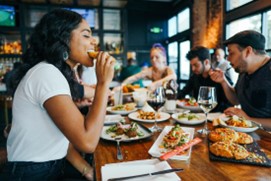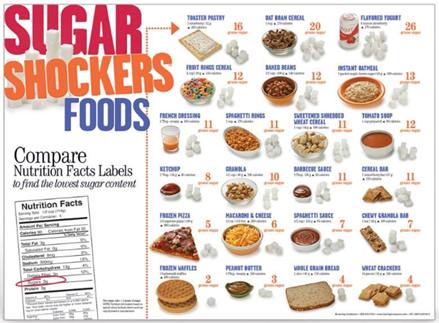
By: Dr. Dana Stallings
Who doesn’t love eating out?! Whether it’s a special occasion, or simply because we didn’t make it to the grocery store this week, eating out is an activity that few of us can avoid. The CDC estimates that 3 in 5 Americans eat dinner out at least once a week. So if you have diabetes, it helps to know what your best options are to avoid having to chase your blood sugars later.
Reducing your intake of fast food is the first step. Many fast food restaurants now have healthier options on their menus, such as grilled chicken and fruit cups or side salads, but fast food also tends to have higher saturated fat and added sugars. Let’s break these down a bit before we move on.
“Saturated fats are found in animal-based foods like beef, pork, poultry, full-fat dairy products and eggs. They are typically solid at room temperature. Saturated fats can cause problems with your cholesterol levels, which can increase your risk of heart disease. Replacing foods that are high in saturated fat with healthier options can lower risk of heart disease. The American Heart Association recommends aiming for a dietary pattern that achieves 5% to 6% of calories from saturated fat. For example, if you need about 2,000 calories a day, no more than 120 of them should come from saturated fat.” (Source: Saturated Fat | American Heart Association)

If you are an existing patient of Southside Diabetes, you have seen the Sugar Shockers posters on the walls in our exam rooms. “Added sugars include sugars that are added during the processing of foods (such as sucrose or dextrose), foods packaged as sweeteners (such as table sugar), sugars from syrups and honey, and sugars from concentrated fruit or vegetable juices. They do not include naturally occurring sugars that are found in milk, fruits, and vegetables. The Daily Value for added sugars is 50 grams per day based on a 2,000 calorie daily diet. For most Americans, the main sources of added sugars are sugar-sweetened beverages, baked goods, desserts, and sweets.” (Source: Added Sugars on the Nutrition Facts Label | FDA)
Full-service or sit-down restaurants are not immune to saturated fats nor added sugars. Fats and sugars taste good, so restaurants add one or both to their dishes to keep you coming back for more. As a matter of fact, sugar stimulates the same pleasure centers in your brain as cocaine, so the addition of sugar to foods literally makes you continuously crave these foods. The more you crave, the more you buy – which makes restaurants and food manufacturers happy! However, consuming these foods too often can wreak havoc on your diabetes and cardiovascular health.
So what’s a hungry human to do?
- Start by planning ahead! Decide where you are going ahead of time so you can examine the menu online. Decide what you are going to order before you get there and stick with it. Looking at the menu or specials when you arrive will tempt you to make less healthy choices. Stick to your plan!
- Drink at least once full glass of water when you sit down at the table. This will help you feel less hungry and help maintain portion control and moderation when your food arrives to prevent overeating.
- Skip the starters. This includes appetizers, as well as the free chips and salsa or bread and butter served when you arrive. Better yet, decline them altogether to reduce temptation.
| EAT THIS | NOT THAT |
| Baked, steamed, grilled, broiled | Fried, breaded, crispy, creamy |
| Veggies | Fries |
| Sauces and dressings on the side | BBQ, glazed, sticky, honey, teriyaki |
| Share a main entrée with your friend or spouse | Limit or skip the alcohol (causes overeating) |
| Request a to-go box and package half your food when it arrives | Salads loaded with dressing, cheese, croutons, bacon (“healthy” trap!) |
| Skip dessert or share dessert with the table | Starters: chips & salsa, bread/rolls & butter |
Source: Eating Out | CDC
Above all, remember the SSD mantra: portion control and moderation, not deprivation. Enjoy yourself when you go out! Just remember to moderate the enjoyment so you don’t regret your decisions later. The ability to learn and practice self-control allows you to be in the moment with your dinner companions and enjoy yourself when you go out – instead of stressing over every bite you take, or obsessing over your blood sugars later.
